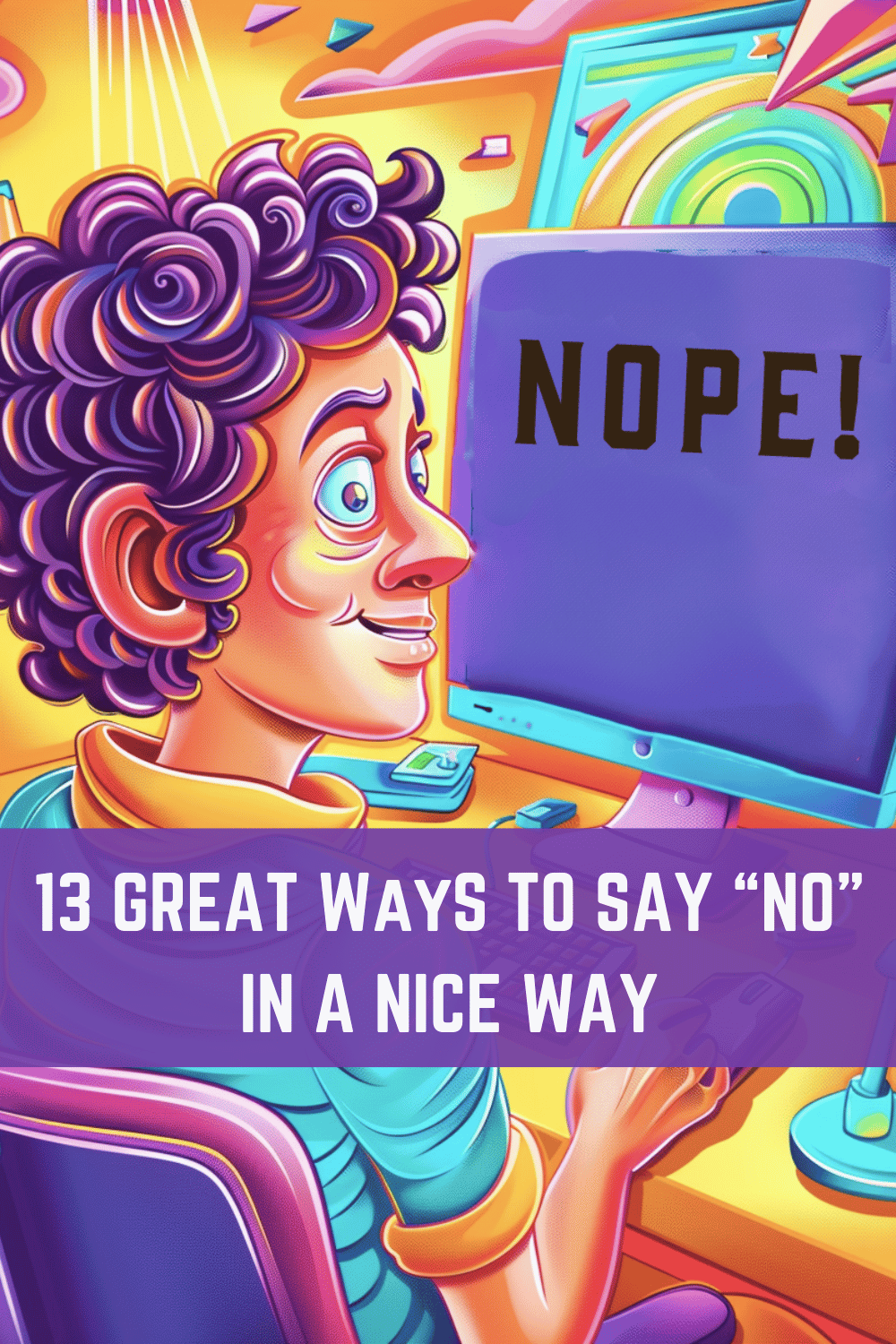Just like there are many ways to say thank you, there are lots of options for politely turning somebody down.
Of course, when someone asks you to do something you don’t want to take on, it’s tempting to react brusquely. They’ll definitely leave you alone if you’re rude, right?
While that might be true, rudeness can be a double-edged sword. Imagine if you need a favor in the future. Someone you brutally shot down will be more than happy to return the favor.
More importantly than that, though, people are more likely to accept your response at face value if you react politely. Besides, there’s nothing wrong with asking for help.
Of course, rudeness may be accidental, especially if you’re not good at responding to pressure in the moment.
If that sounds like you, relax! We’re here to help.
13 ways to say “no” in a nice way
- “I’m sorry, I can’t.”
- “I wish I could, but I’m already overextended.”
- “Thank you for thinking of me. Unfortunately, I’m unable to take that on.”
- “I’m flattered you would ask me, but I’m afraid I have to decline.”
- “I might be able to do that another time, but I can’t today.”
- “I don’t have any room in my schedule, sorry.”
- “I can’t do that myself, but if you like I can think about who else might be a good fit.”
- “Sorry, but I really need to focus on other things at the moment.”
- “I have too many other commitments right now.”
- “I’m so distracted right now that I can’t.”
- “That’s really sweet, but I’ll have to decline.”
- “I’m sorry, I have other plans already.”
- “I’m really sorry, but I have to turn you down.”
The fine art of turning someone down without hurting their feelings
There are several tricks to politely but firmly saying no.
One option is to simply say no while using polite words like “sorry” or “I apologize.”
If straight up saying “no” is too intense, you can point the blame for your refusal to other circumstances.
If you’re too busy to do something, say so. If you’re overextended, you won’t be doing your best work anyway.
Likewise, if the problem is that you aren’t really interested or don’t have the right skills, pointing that out can defuse a tense situation and show the person who asked you that it’s nothing personal.
In both of these cases, it’s important to realize that saying “no” when you are unable to do something is actually more polite than saying “yes,” because it doesn’t waste the other person’s time–or your own.
One last word of advice is to tell it straight. A rejection is no time to break out the dry humor.
Instead, just be sincere and apologetic.
At the core of all these techniques is one simple thing you need to remember: that you need to respect the feelings of person asking you for something as well as your own boundaries.
Scientific studies have shown that establishing boundaries like this is better for your mental health and can even lead to stronger relationships.
So long as you keep that basic principle in mind, you can come up with endless ways to say no politely.
With the theory out of the way, let’s now go through some ready-to-use examples!
1. “I’m sorry, I can’t.”
This is the simplest way to say no without being rude. You just apologize, and then go straight into declining.
While that might not seem very polite, you’re showing you respect the time and professionalism of the person asking you for something by turning them down without needing an excuse.
This option is so versatile you can be use it in almost any circumstance.
2. “I wish I could, but I’m already overextended.”
If the reason you’re saying no is because you’re too busy, you can lessen the sting of your rejection by pointing that out.
In this example, we use the word “overextended,” which is well suited to a professional setting. For a more casual no, you can say “too busy” instead.
3. “Thank you for thinking of me. Unfortunately, I’m unable to take that on.”
This is another way to politely say “no” when someone is asking you to do something for them.
By thanking them for considering you before turning them down, you’re showing that you respect their opinion. This will make them feel good even though you can’t do what they’re asking for.
Again, this is typically useful in a business or other formal setting.
4. “I’m flattered you would ask me, but I’m afraid I have to decline.”
You can’t always articulate why you’re saying no. Even when that’s true, you can still thank the person for asking you.
This example works in a similar way to the previous one. First, you show your gratitude.
Then, you politely say no.The key difference here is that this formula works in almost any situation, because you aren’t saying why you can’t do something–you’re just saying you can’t.
5. “I might be able to do that another time, but I can’t today.”
There are many times when you don’t actually want to say no. Perhaps you’re just really busy at the moment, but normally you’d leap at this chance.
In that case, you definitely want to be polite. It’s also important to let the person you’re talking to know that you actually would be interested at another time.
You can use this example in any professional or casual setting where you want to leave the door open to being asked again in the future.
6. “I don’t have any room in my schedule, sorry.”
Unlike the previous example, this one is great for when you need to say no because you’re too busy, but you also don’t want to be asked if you can help later.
Even though you’re not offering the olive branch of help later on, this one is still a polite way to say no to a specific, usually time-sensitive task.
Saying “sorry” at the end drives home that you’re not out to hurt anyone’s feelings.
7. “I can’t do that myself, but if you like I can think about who else might be a good fit.”
Sometimes, the problem isn’t time management. If you’re a poor fit for a project or aren’t interested in it, those are also great reasons to turn someone down.
In these cases, the best olive branch you can offer is to suggest someone else who would do better. Of course, not everyone wants unsolicited advice, so be sure to ask before you start rattling off names.
Keep in mind that if you tell someone you will look into it, you should be sure to follow up. Nothing is ruder than saying you’ll do something you don’t intend to.
8. “Sorry, but I really need to focus on other things at the moment.”
The vagueness of “focus on other things” makes this option great not just for workplace requests but for personal ones.
Need to turn someone down after being asked on a date? They’ll assume the things you need to focus on are non-romantic ones like work or family.
This response also doesn’t require you to have a busy schedule, so it’s great in a professional setting, where “focus on other things” will be interpreted to mean things other than your job.
9. “I have too many other commitments right now.”
Another way of letting people know that your focus is elsewhere, and you can’t take on anything else is to talk about your “commitments.”
This one may seem like it only works in the workplace, but you can also use it to let people know you can’t volunteer for an organization.
You can even reach for it when you need to turn down a time-consuming request from family or anything else that will require you to be available on multiple occasions.
10. “I’m so distracted right now that I can’t.”
Again, this is a great option for when you want to be vague about why you’re turning something down. You’re not saying that you’re busy or uninterested, just that you “can’t.”
One thing to keep in mind here is that people may ask why you’re distracted or want to make sure you’re okay.
That’s because “distracted” is sometimes used as a polite way to say you’re upset or stressed out.
11. “That’s really sweet, but I’ll have to decline.”
Unlike many of the other options, this one is a catch-all. You’re not saying why you have to say no, just politely reiterating that you’re turning down the request.
If “sweet” isn’t something you normally say, you can swap the first half of the sentence out for another phrase, like “That sounds great.”
12. “I’m sorry, I have other plans already.”
Like several other responses, this one starts out with “sorry.” Again, apologizing lets the other person know that you’re trying to respect their feelings.
Here, you can say no by stating that you already have something else you need to do.
This kind of response is usually best suited for situations when someone is asking you to set aside a specific time to do something, either with them or without.
13. “I’m really sorry, but I have to turn you down.”
Our final way to say no is another universal one.
There are no specific reasons that you’re saying no here. You aren’t blaming a lack of time, interest, or ability, and you aren’t trying to suggest vaguer reasons either.
What makes this option stand out beyond its universal approach is the phrase “have to.”
This phrasing is polite because it implies that the reasons you’re saying no are beyond your control. Added to the “really” in front of sorry, that makes this response extra polite.

Hey fellow Linguaholics! It’s me, Marcel. I am the proud owner of linguaholic.com. Languages have always been my passion and I have studied Linguistics, Computational Linguistics and Sinology at the University of Zurich. It is my utmost pleasure to share with all of you guys what I know about languages and linguistics in general.


